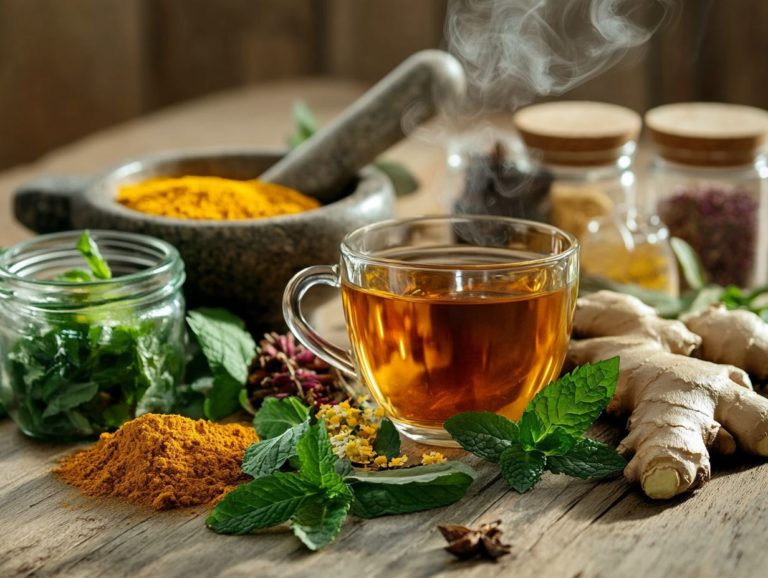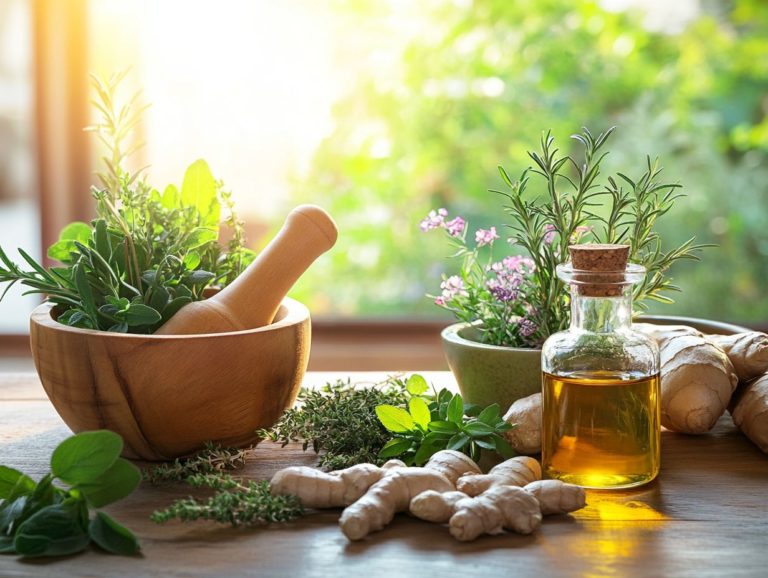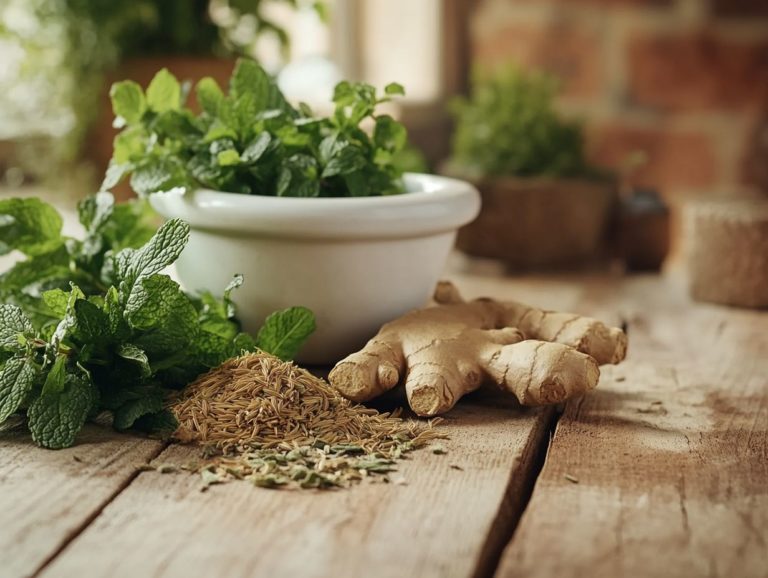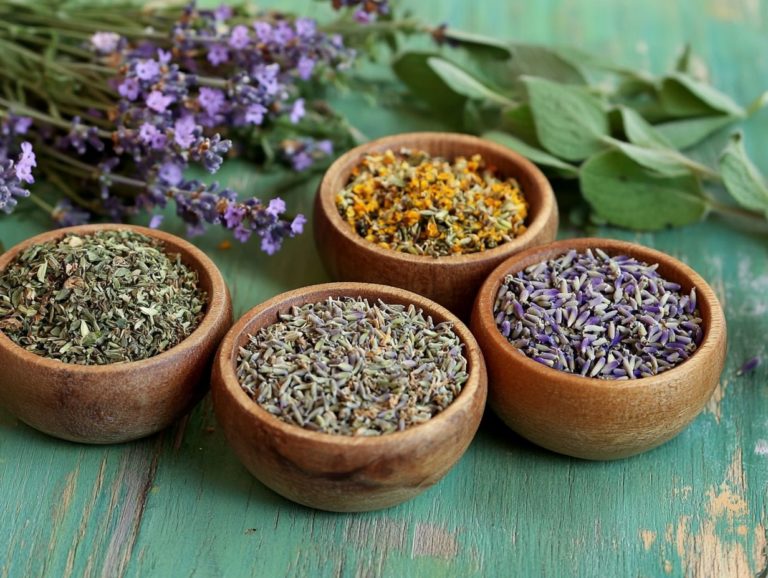How to Use Herbs for Seasonal Allergies
Seasonal allergies can transform delightful spring days into a sneezing, itchy-eyed struggle for many. Recognizing the triggers and symptoms is your first step toward effectively managing these reactions.
Fortunately, nature presents a range of herbs that can offer relief. This article delves into potent herbal remedies, guiding you on how to seamlessly incorporate them into your daily routine. You’ll also find tips for combining them for optimal results.
You ll learn about potential side effects and the right moments to seek advice from a healthcare professional. Let s dive in and discover how you can breathe easier today!
Contents
- Key Takeaways:
- Understanding Seasonal Allergies
- Common Herbs for Allergy Relief
- Using Herbs for Allergy Relief
- Combining Herbs for Maximum Relief
- Possible Side Effects and Precautions
- Frequently Asked Questions
- What are some common herbs used for seasonal allergies?
- How do I use herbs for seasonal allergies?
- Can I use herbs for seasonal allergies as a replacement for medication?
- How long does it take for herbs to work for seasonal allergies?
- Are there any side effects of using herbs for seasonal allergies?
- Can herbs be used for children with seasonal allergies?
Key Takeaways:
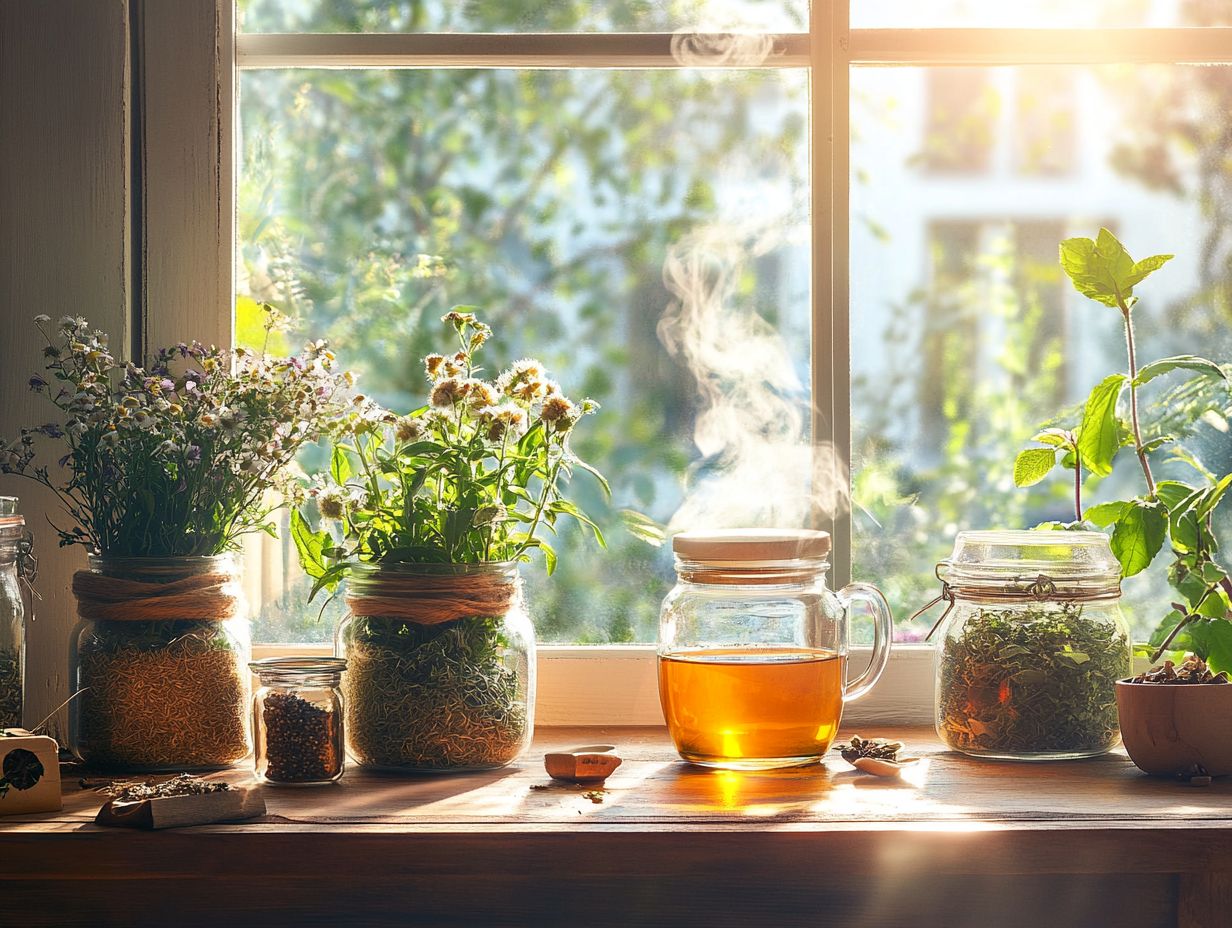
- Incorporating herbs into your routine can help alleviate seasonal allergies and allergic rhinitis by reducing inflammation and boosting your immune response.
- Effective herbs like Butterbur, Stinging Nettle, and Echinacea can bolster your immune system during allergy season. Each herb has unique benefits and can be consumed in different forms, such as teas, capsules, or tinctures.
- Combining herbs provides maximum relief from seasonal allergies. Consult a doctor if you experience any side effects or if your allergies persist.
Understanding Seasonal Allergies
Grasping the nuances of seasonal allergies is essential for millions grappling with symptoms during certain times of the year. These symptoms are typically sparked by pollen exposure from trees, grasses, and weeds.
These reactions arise when your immune system mistakenly perceives harmless substances as threats. In response, your body releases chemicals called histamines, resulting in familiar symptoms like sneezing, nasal congestion, and itchy eyes.
Recognizing common allergens such as pollen and dust is a pivotal step in managing your allergies effectively. This awareness enables you to take proactive measures to alleviate your discomfort.
What are Seasonal Allergies?
Seasonal allergies are those pesky reactions that strike at particular times of the year. They are mainly triggered by exposure to pollen from various plants and trees.
You’ll find these reactions are most prevalent during spring, summer, and early fall, when flowering plants, grasses, and weeds release their pollen into the air. Unlike other allergies, seasonal allergies are confined to specific seasons, dictated by the life cycles of plants. To manage these symptoms, consider exploring herbal remedies for allergies.
Your immune system mistakes these airborne allergens for threats, leading to symptoms like sneezing, congestion, and itchy eyes. Understanding this distinction helps you better manage your symptoms during peak pollen seasons. Additionally, exploring creating herbal remedies for cold symptoms can provide relief during allergy flare-ups.
Common Herbs for Allergy Relief
Common herbs for allergy relief have been relied upon for centuries to ease allergy symptoms. They offer a natural alternative to over-the-counter medications that may only provide temporary relief.
Many effective herbs boast anti-inflammatory properties and serve as natural antihistamines. These substances help block the effects of histamines, reducing allergy symptoms and enhancing your overall well-being during allergy season. Additionally, learning about how herbs can help with seasonal flu can further support your health during this time.
Effective Herbs and Their Benefits
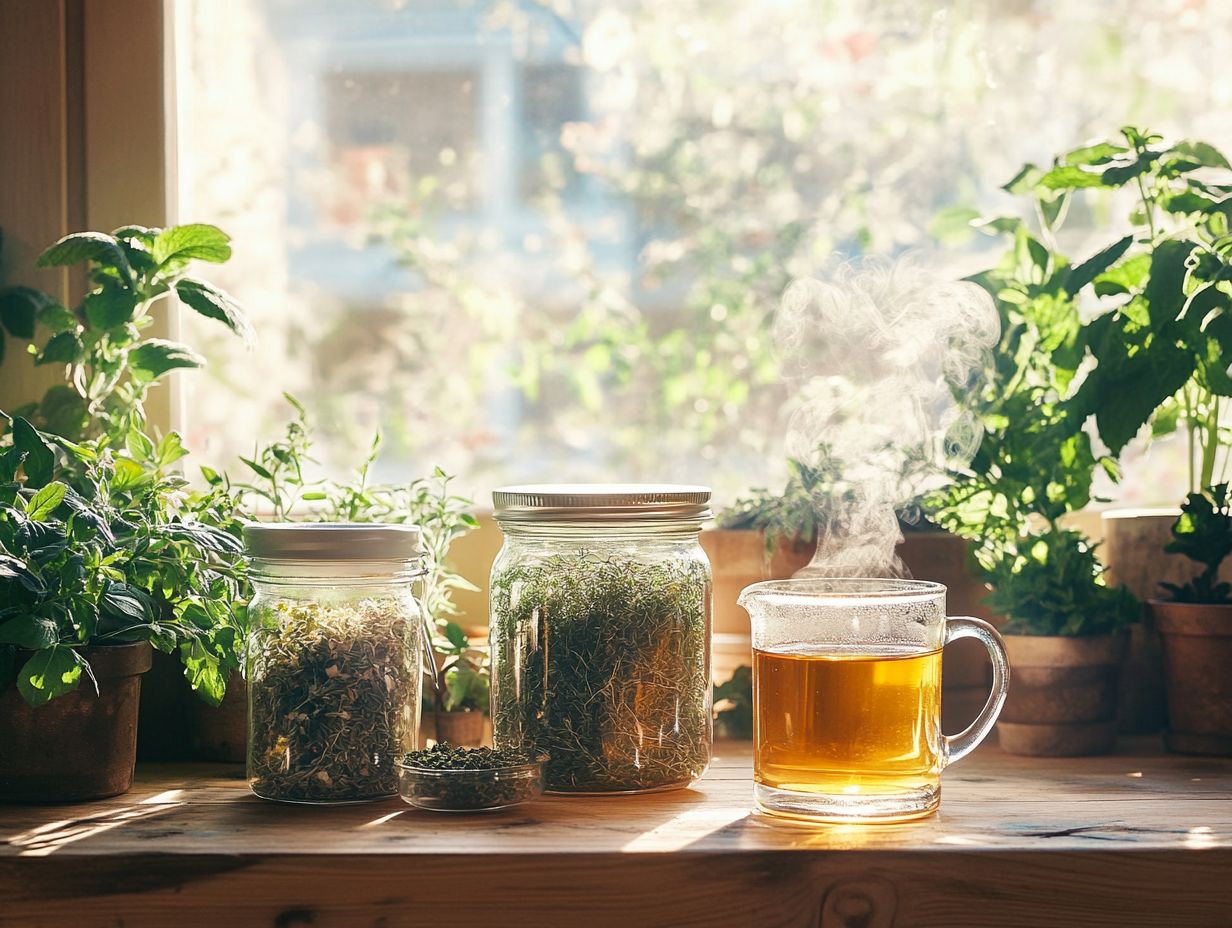
Several effective herbs, such as Butterbur, Quercetin, and Stinging Nettle, offer substantial benefits for those dealing with seasonal allergies.
These natural remedies have garnered attention for their ability to alleviate common allergy symptoms like sneezing, nasal congestion, and itchy eyes. Butterbur is celebrated for its anti-inflammatory properties. It can help reduce nasal swelling and improve airflow, allowing you to breathe easier when pollen levels soar. Additionally, exploring top herbal remedies for skin allergies can provide further relief for those dealing with skin issues related to allergens.
Quercetin, a powerful flavonoid sourced from various plants, acts as a natural antihistamine, stabilizing mast cells, which trigger allergic reactions, and curbing the release of histamine in your body often the culprit behind those pesky allergy flare-ups. Meanwhile, Stinging Nettle is recognized for its anti-inflammatory effects, and numerous studies show it effectively lowers the production of inflammatory substances. For those looking for more natural options, consider these quick DIY herbal remedies for seasonal colds.
These herbs also help with symptom management and promote overall respiratory health, making them invaluable allies in your battle against allergies.
Using Herbs for Allergy Relief
Using herbal remedies to relieve allergies is a smart choice, providing you with a range of consumption methods for optimal effectiveness.
Whether you prefer teas, tinctures, or capsules, herbal treatments can enhance allergy management strategies. You might wonder, can herbal remedies help with allergies? This exploration enables you to discover the most suitable form of supplementation to seamlessly incorporate into your personalized treatment plan.
Methods of Consumption
Discover exciting methods you can use for consuming herbal supplements to alleviate allergy symptoms, including teas, capsules, and nasal irrigation techniques like sinus rinses. Each of these approaches comes with its own preparation methods, dosages, and levels of efficacy, tailored to meet your unique needs.
For instance, herbal teas, brewed from dried flowers and leaves, provide a calming beverage that you can enjoy multiple times a day. Just remember to adhere to the recommended brewing times to unlock their full benefits. You can also explore creating herbal remedies for seasonal changes for more options. Capsules, on the other hand, offer the convenience of precise dosages perfect for those who appreciate a straightforward method and want to seamlessly integrate them into their daily routine.
If you prefer a more hands-on approach, nasal irrigation techniques such as sinus rinses can effectively flush out allergens and mucus from your nasal passages, delivering immediate relief from congestion. Just ensure that you use the right technique and prepare the saline solution correctly for optimal results.
Explore these various options and find what works best for you to effectively manage your allergy symptoms.
Combining Herbs for Maximum Relief
Mixing herbs can boost the effectiveness of your allergy treatments. Many herbs showcase synergistic effects when used together, creating a powerful remedy.
By pairing the right herbs, you can optimize your allergy relief regimen and tackle multiple symptoms at once, ensuring a comprehensive approach to your well-being.
Synergistic Effects of Different Herbs
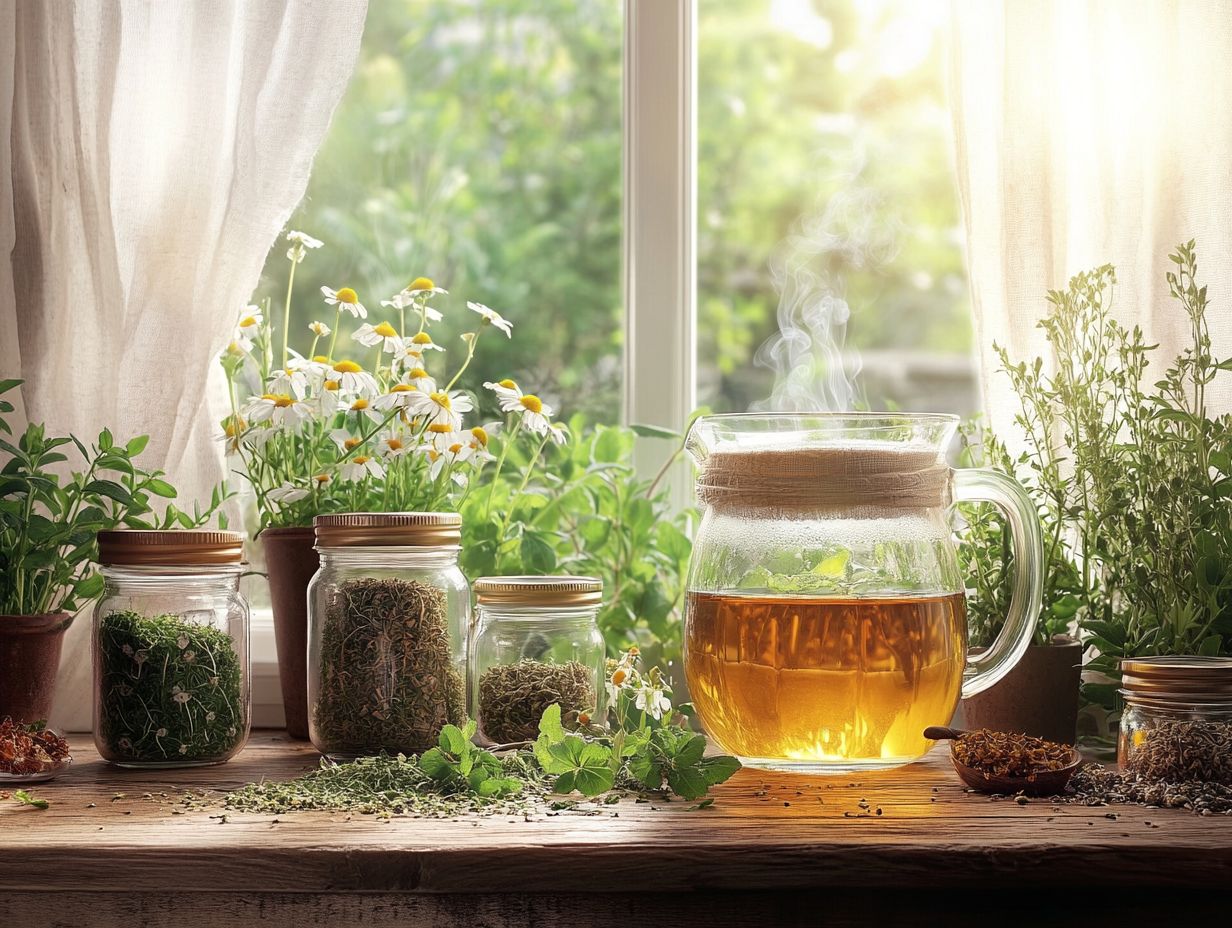
The synergistic effects of various herbs can significantly amplify their overall effectiveness in treating allergies, enhancing your immune response and offering comprehensive relief from those pesky symptoms.
For instance, when you combine herbs like nettle and quercetin, you create a formidable duo: nettle serves as a natural antihistamine, while quercetin stabilizes mast cells, curbing the release of histamine. Adding butterbur to the mix, known for its impressive anti-inflammatory properties, can further ease symptoms like nasal congestion and sneezing. You may also consider trying healing teas for seasonal allergies to complement these remedies.
Consider the blend of turmeric and ginger; both are renowned for their potent anti-inflammatory abilities that tackle the root causes of allergic reactions. By harnessing these herbal combinations, you can achieve not just temporary relief but also a stronger defense against seasonal allergens, utilizing natural herbal remedies for allergies.
Possible Side Effects and Precautions
While herbal remedies can offer significant relief from allergy symptoms, it’s crucial to be aware of potential side effects and take the necessary precautions for safe usage.
Staying informed is key, as some herbs may interact with medications or worsen specific conditions. Prioritizing your safety ensures you can enjoy the benefits of herbal remedies without compromising your well-being.
When to Consult a Doctor
Knowing when to consult a doctor is essential for managing allergy symptoms and crafting a tailored treatment plan that truly works for you.
Recognizing certain warning signs can be foundational; for example, if you experience persistent sneezing, itchy eyes, or skin irritations, these may indicate an underlying issue that deserves professional attention.
Allergy assessments can pinpoint specific allergens, enabling healthcare professionals to develop treatment strategies tailored to your unique needs.
By undergoing thorough evaluations, experts can guide you in navigating your symptoms more effectively, providing insights on lifestyle adjustments, medication options, and potential immunotherapy treatments that could significantly enhance your quality of life.
Frequently Asked Questions
What are some common herbs used for seasonal allergies?
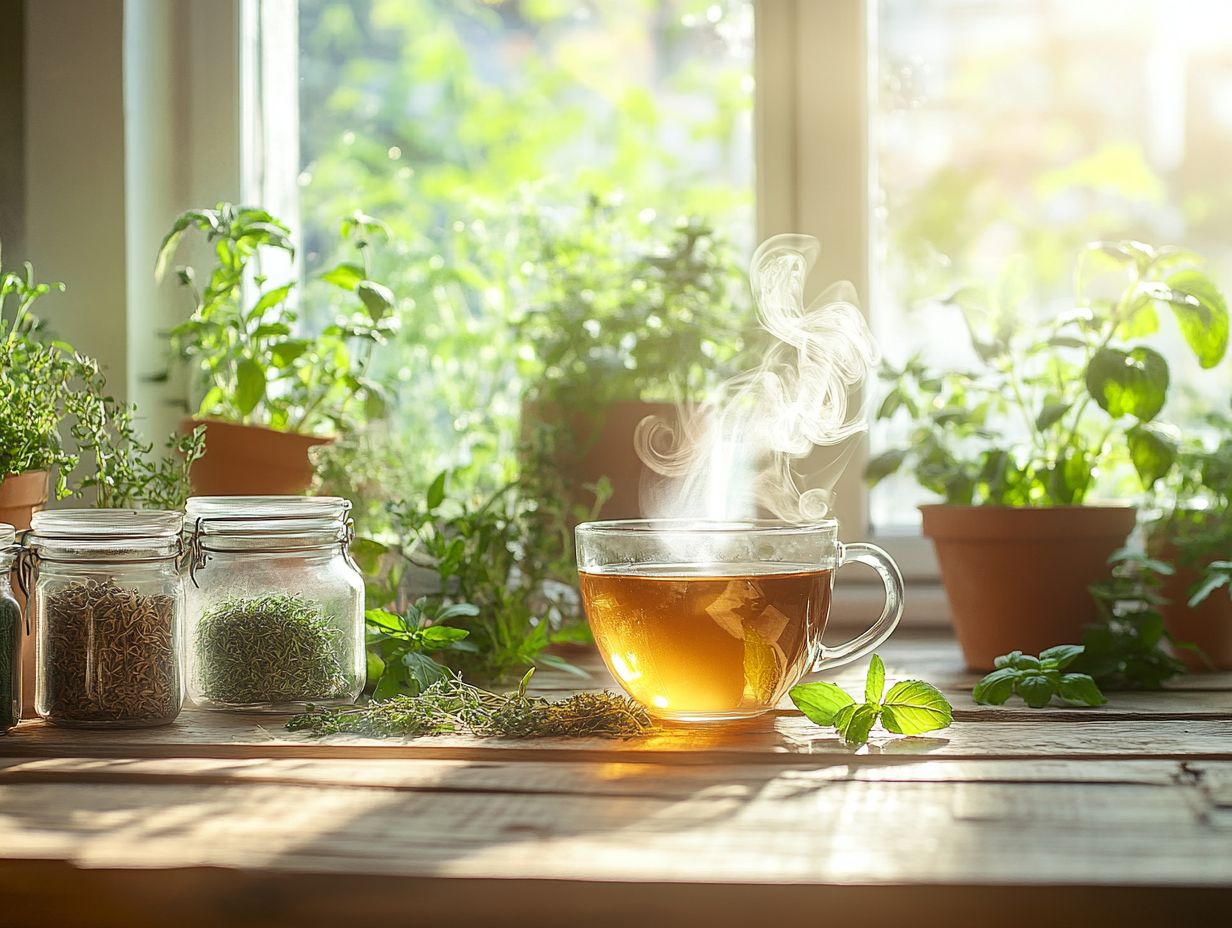
Some common herbs for seasonal allergies include nettle, butterbur, ginger, turmeric, and elderflower.
How do I use herbs for seasonal allergies?
Herbs for seasonal allergies can be used in various forms teas, tinctures, capsules, or as topical ointments. The method may vary depending on the herb and personal preference.
Can I use herbs for seasonal allergies as a replacement for medication?
While herbs can provide relief for seasonal allergies, they should not replace prescribed medication. Always check with a healthcare professional before making changes to any treatment plan.
How long does it take for herbs to work for seasonal allergies?
The time it takes for herbs to work can vary depending on the individual and the severity of their allergies. Some may experience relief immediately, while others might take a few days or weeks to see results.
Are there any side effects of using herbs for seasonal allergies?
While herbs are generally safe, some may experience side effects such as upset stomach or allergic reactions. It’s important to start with small doses and monitor any changes in your body while using them.
Can herbs be used for children with seasonal allergies?
Some herbs may be safe for children, but it’s best to consult with a pediatrician before giving any herbs to children. Always follow proper dosage guidelines for children.
Ready to tackle your allergies with nature’s help? Explore more about herbal remedies and consult your healthcare provider for tailored advice!

